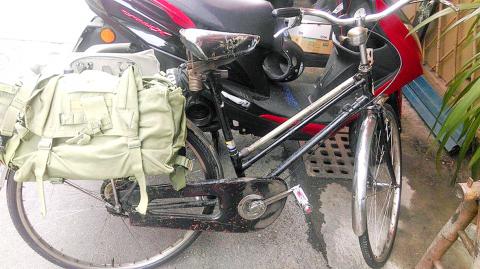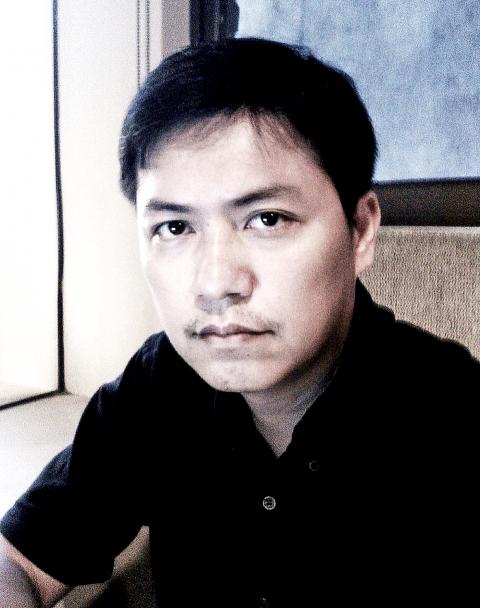Novelists usually pursue fame and book sales through publicists, book fairs and social media, but Wu Ming-yi’s (吳明益) approach has been far from typical. The novelist and academic spent the summer holiday riding an antique bicycle around Taiwan, meeting fans and giving lectures at small, independent bookstores to promote his book, The Stolen Bicycle (單車失竊記).
“People appreciate the opportunity to connect with me more intimately in these small spaces,” Wu told a standing-room-only audience at Tainan’s Lingo Bookstore (林檎二手書室). He added that he was a marketing major in college, and it was ironic that he chose to go against everything he learned about marketing and promotion.
Wu says he enjoys sharing the knowledge that he learned about Taiwan’s flora and fauna in his research papers, and started building a following that appreciated his message of ecological conservation. Eventually, he began toying with the introduction of creative fiction to enhance his message, and his career as a novelist developed.

Photo: Tony Coolidge
The novel, inspired by his love for bicycles and Taiwanese history, brings readers back to a simpler time when life moved more slowly and people spent more time face-to-face with friends and neighbors. Riding a bike allowed people to appreciate and digest the details of the world around them.
Wu said that success growing a fan base in Taiwan was not easy until he partnered with a talented literary agent and translator who helped him generate success overseas.
Although Wu shunned modern marketing and choose a grueling, sweaty book promotion schedule at small venues around the nation, the whole experience furthered his reputation as an approachable man who preferred to have a meaningful discussion over coffee rather than take a selfie with a fan. And Wu seems committed to enduring more heat and sweat to make sure more people get it.

Photo courtesy of Wu Ming-yi

In Taiwan there are two economies: the shiny high tech export economy epitomized by Taiwan Semiconductor Manufacturing Co (TSMC, 台積電) and its outsized effect on global supply chains, and the domestic economy, driven by construction and powered by flows of gravel, sand and government contracts. The latter supports the former: we can have an economy without TSMC, but we can’t have one without construction. The labor shortage has heavily impacted public construction in Taiwan. For example, the first phase of the MRT Wanda Line in Taipei, originally slated for next year, has been pushed back to 2027. The government

July 22 to July 28 The Love River’s (愛河) four-decade run as the host of Kaohsiung’s annual dragon boat races came to an abrupt end in 1971 — the once pristine waterway had become too polluted. The 1970 event was infamous for the putrid stench permeating the air, exacerbated by contestants splashing water and sludge onto the shore and even the onlookers. The relocation of the festivities officially marked the “death” of the river, whose condition had rapidly deteriorated during the previous decade. The myriad factories upstream were only partly to blame; as Kaohsiung’s population boomed in the 1960s, all household

Allegations of corruption against three heavyweight politicians from the three major parties are big in the news now. On Wednesday, prosecutors indicted Hsinchu County Commissioner Yang Wen-ke (楊文科) of the Chinese Nationalist Party (KMT), a judgment is expected this week in the case involving Hsinchu Mayor Ann Kao (高虹安) of the Taiwan People’s Party (TPP) and former deputy premier and Taoyuan Mayor Cheng Wen-tsan (鄭文燦) of the Democratic Progressive Party (DPP) is being held incommunicado in prison. Unlike the other two cases, Cheng’s case has generated considerable speculation, rumors, suspicions and conspiracy theories from both the pan-blue and pan-green camps.

Stepping inside Waley Art (水谷藝術) in Taipei’s historic Wanhua District (萬華區) one leaves the motorcycle growl and air-conditioner purr of the street and enters a very different sonic realm. Speakers hiss, machines whir and objects chime from all five floors of the shophouse-turned- contemporary art gallery (including the basement). “It’s a bit of a metaphor, the stacking of gallery floors is like the layering of sounds,” observes Australian conceptual artist Samuel Beilby, whose audio installation HZ & Machinic Paragenesis occupies the ground floor of the gallery space. He’s not wrong. Put ‘em in a Box (我們把它都裝在一個盒子裡), which runs until Aug. 18, invites